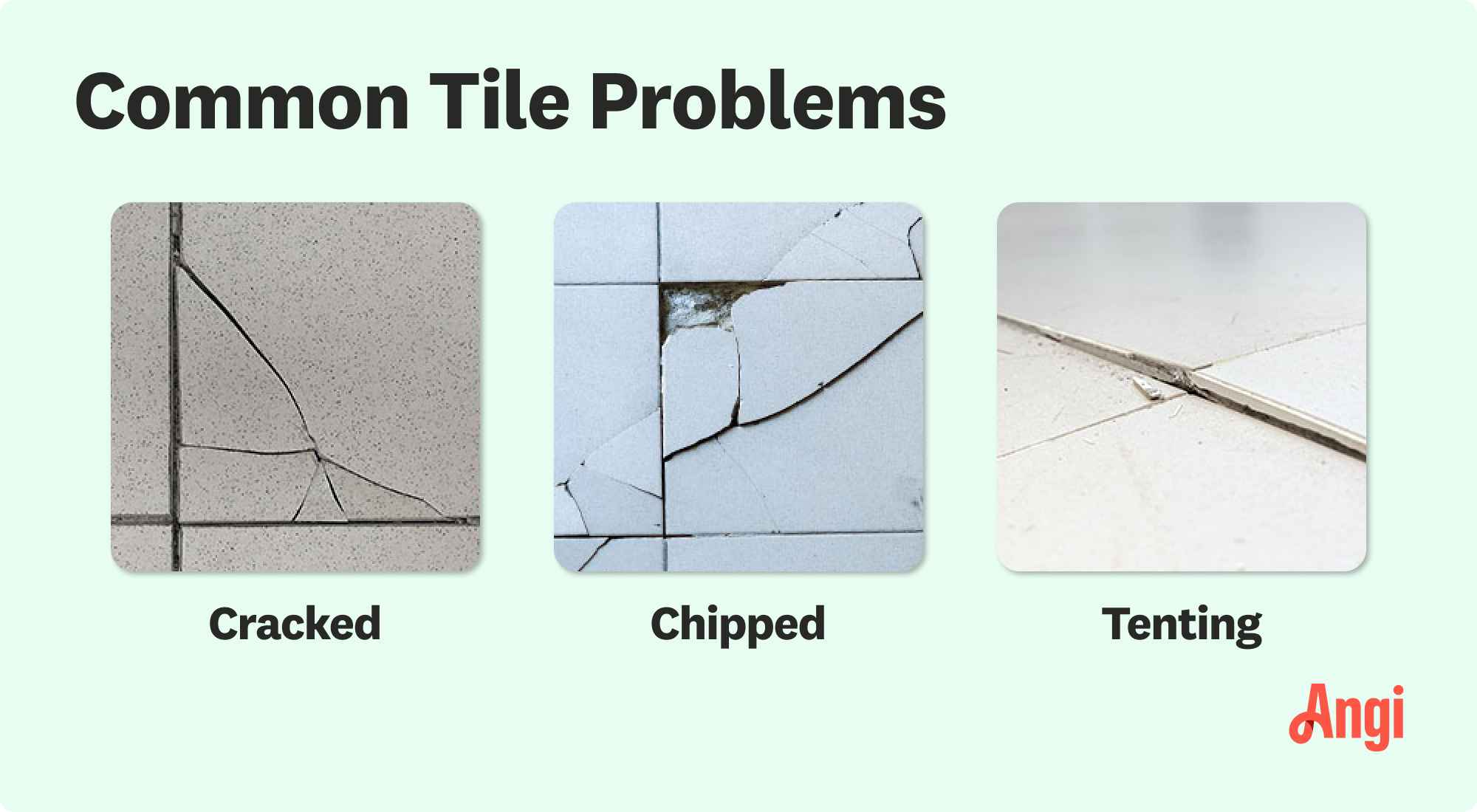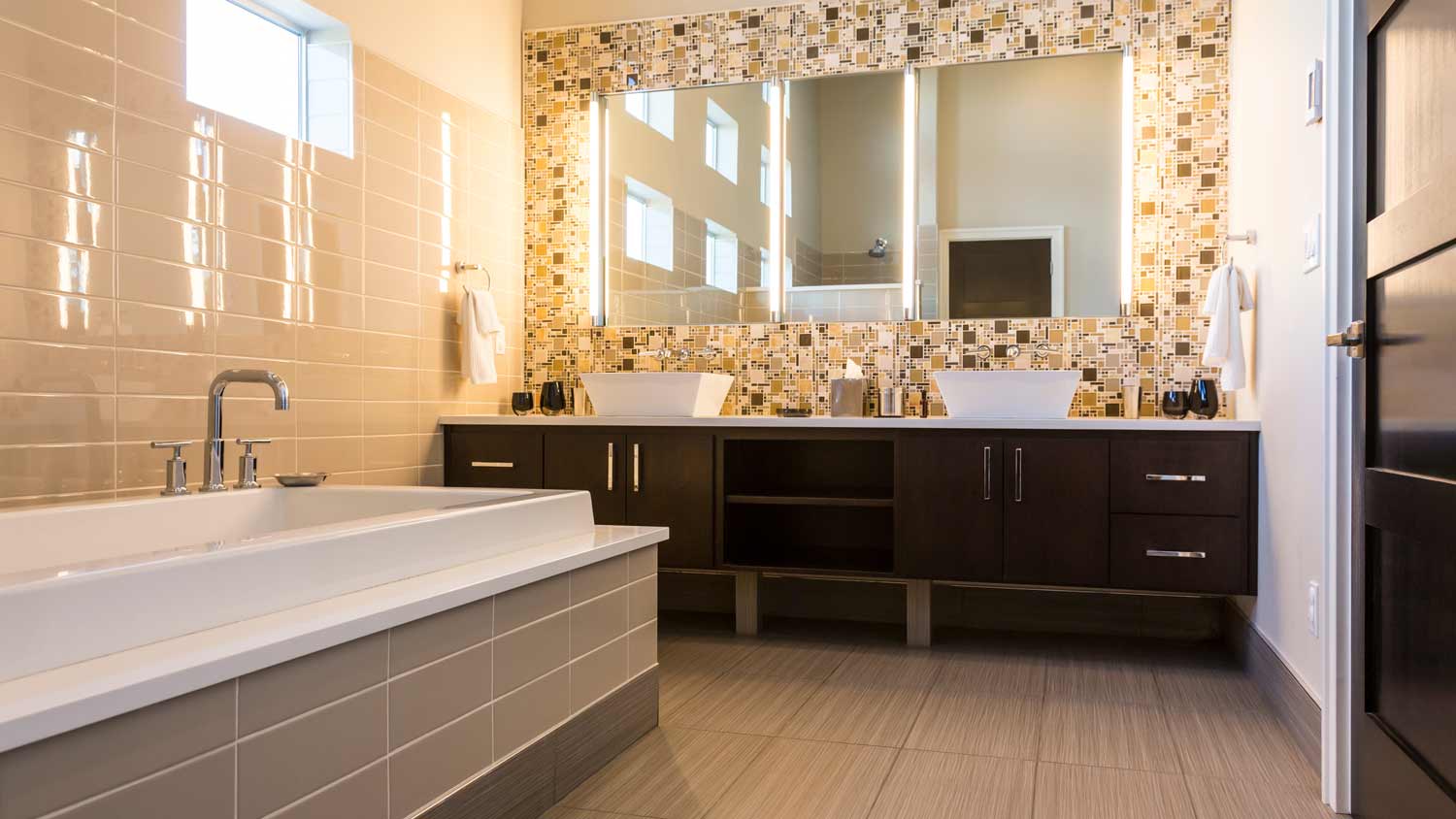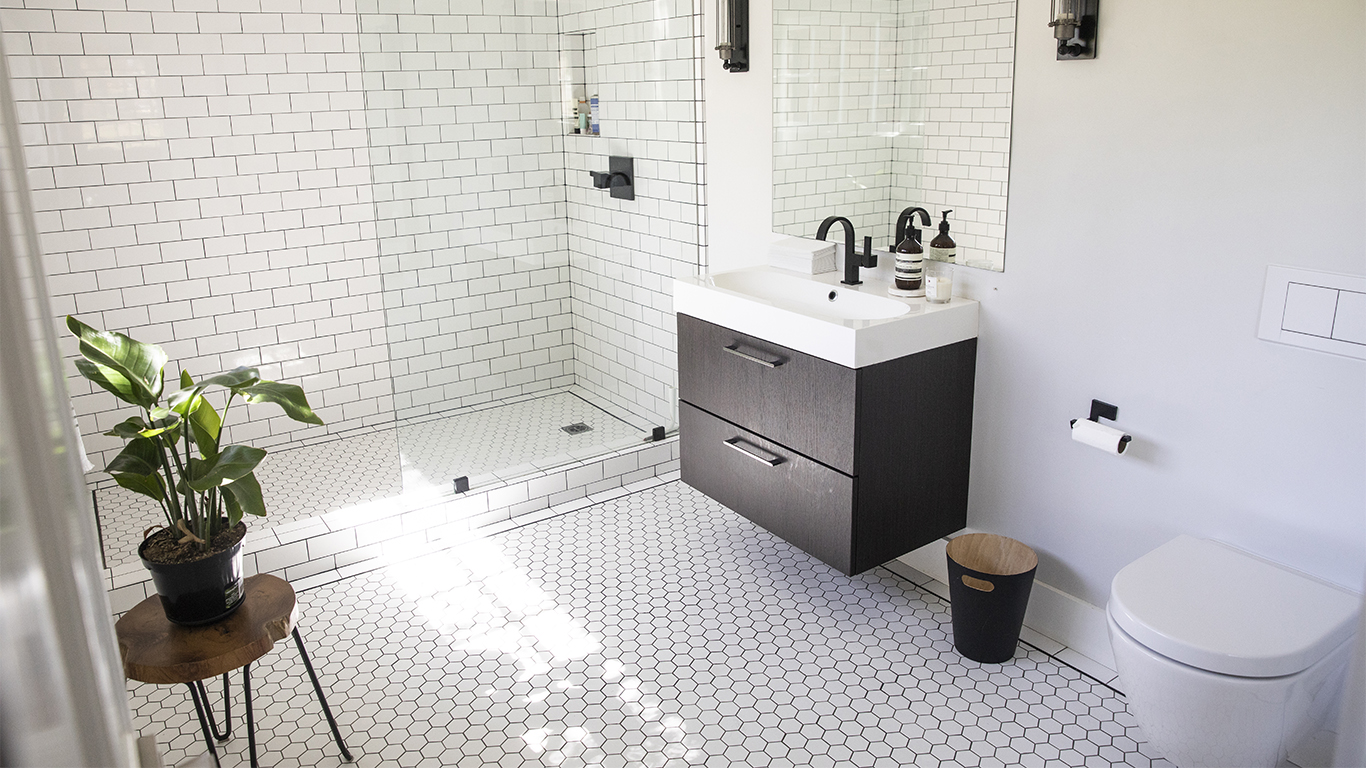.jpg?impolicy=leadImage)
Sealing your grout goes a long way toward extending its life span. This guide breaks down the cost factors for sealing grout, including size, materials, and labor.
Tile repair costs $466 on average for a 100-square-foot space, or between $280 and $662, depending on the project's size and scope. A local pro can give you a quote that accounts for the specifics of your ideal results.


Fixing a small chip is easy, but bigger fixes, like regrouting, increase the cost.
Urgent repairs, such as fixing water damage behind tiles, are more expensive.
Ceramic is the least expensive type of tile to repair, while marble often costs the most to fix.
Hiring a tile contractor over a handyperson costs more but will lead to better results.
Repairing tile in moisture-prone areas, like pools or showers, will cost more.
Whether it’s cracked tiles, crumbling grout, or another problem, most tile repair jobs will cost you $466, but prices can range from as little as $140 up to $1,150 or more, including materials and labor. Even if it’s something as minor as a small chip, taking care of these issues right away can help prevent bigger problems in the future. Here’s a breakdown of your overall tile repair cost.
Here’s a look at the different factors that could affect the tile repair cost.
The cost of your tile repair will depend on many factors, but the size of the area will have the biggest impact. To get a rough estimate, calculate the space's square footage. On average, you can expect to pay $30 per square foot.
You may need various repairs, from fixing a small chip to a full tile replacement. Many companies charge a minimum fee ranging from $100 to $300.
Here are some common repairs that you may run into:
| Type of Repair | Average Cost |
|---|---|
| Cracked or broken tiles | $130–$500 |
| Chips or holes in tiles | $50–$400 |
| Tile replacement | $120–$500 |
| Water damage | $1,500–$2,000 |
| Shower retiling | $800–$3,000 |
| Grout repair | $100–$700 |
Consider your tile type to determine the cost of your repair. Depending on your materials, the cost will range between $1 and $40 per square foot or more.
Additionally, labor costs $7 to $30 per square foot. More affordable tile types like ceramic and porcelain are easier to work with, so you can expect labor costs to be on the lower end of the price range compared to something like natural stone.
| Tile Type | Materials Cost per Square Foot |
|---|---|
| Ceramic | $1–$15 |
| Porcelain | $2–$15 |
| Marble | $8–$40 |
| Granite | $5–$14 |
| Slate | $2–$28 |
For more serious issues, you can expect to pay $2 to $45 per square foot for replacement tiles.
To better understand your repair costs, consider where you need the repairs done. Here are common locations and price ranges you can expect.
| Location | Average Cost |
|---|---|
| Bathroom | $100–$150 |
| Shower | $200–$300 |
| Floor | $50–$700 |
| Pool | $75–$250 |
Your tile contractor will charge $60 to $100 per hour, while a handyperson charges $50 to $80 per hour. This equals around $7 to $30 per square foot for labor.
It’s best to spend a little more to hire a tile contractor who has the specialized skill set to properly install tile that holds up well to traffic, moisture, and other elements. Look for a tile contractor with at least three years of experience, and check their portfolio or references to find someone who does similar work to your project, such as someone with experience laying penny tile or waterproofing shower tile.

Depending on the issue you're facing, you can get a general idea of the cost of your repair.
| Type of Issue | Average Cost |
|---|---|
| Cracked or broken tile | $130–$500 |
| Chipped tile | $50–$400 |
| Tile tenting | $120–$500 |
| Floor tile replacement | $50–$700 |
| Partial shower retiling | $200–$500 |
| Full shower retiling | $500–$2,600 |
| Tile reglazing | $300–$1,200 |
| Grout repair | $700–$1,750 |
Now that you have a good idea of the cost of your tile repair, here are additional costs that may arise. This all depends on your project needs, so check with your contractor.
| Repair Type | Average Cost |
|---|---|
| Water damage repair | $1,500 to $2,000 |
| Tile shower pan replacement | $900 to $3,500 |
| Tile resealing | $0.50 to $2 per square foot |
Tile repair might seem simple, but DIY repair options are limited and results often aren’t seamless (and could lead to further damage). Hiring a local tile repair contractor ensures your tile looks good-as-new, plus it will give you insight into what might be causing the damage to prevent it from happening again.
Tile repair often requires expertise, specialized tools, and experience. Here’s why hiring a pro is the best choice:
Tile repair contractors have the tools needed for precise repairs, including tile cutters, levels, and trowels.
Professionals can handle complex tile types like marble, slate, and other natural stones that require advanced skill to work with.
Pros are able to identify any underlying issues, such as water damage, that can lead to damage on floor tile.
Experienced tile pros can waterproof and regrout tile correctly to prevent future cracking or damage.
If you’re enlisting the services of a tile repair professional, there are still a few DIY-friendly ways to save:
Use leftover tiles from past projects for budget-friendly replacements when working with a contractor
Handle post-repair cleanup after your pro finishes the job
Move furniture, rugs, and other obstructions before your pro arrives

Here are some practical ways that you can save on tile repairs.
Fix your tile issues as soon as you notice them to avoid more cracks and chips throughout your tile.
Compare quotes from at least three contractors to find a great price with a trustworthy pro.
Vet your pro before signing a contract. For example, verify their license, read reviews, and ask past clients for referrals.
Save leftover tiles for future repairs.
Be ready to share photos of the damaged tile with your tile pro, along with details of the room, tile type, and extent of the damage.
Consult your tile pro about whether your tile type affects the cost or feasibility of repairs.
Ask your tile pro about high-traffic or moisture-prone areas and whether these sections will need additional prep.
Home is the most important place on earth, which is why Angi has helped more than 150 million homeowners transform their houses into homes they adore. To help homeowners with their next project, Angi provides readers with the most accurate cost data and upholds strict editorial standards. We’ve surveyed thousands of real Angi customers about their project costs to develop the pricing data you see, so you can make the best decisions for you and your home. We pair this data with research from reputable sources, including the U.S. Bureau of Labor Statistics, academic journals, market studies, and interviews with industry experts—all to ensure our prices reflect real-world projects.
Want to help us improve our cost data? Send us a recent project quote to [email protected]. Quotes and personal information will not be shared publicly.
From average costs to expert advice, get all the answers you need to get your job done.
.jpg?impolicy=leadImage)
Sealing your grout goes a long way toward extending its life span. This guide breaks down the cost factors for sealing grout, including size, materials, and labor.

Whether it’s on your floor, walls, or shower, ceramic tile can add style to your space. So, how much does ceramic tile installation cost? Let’s break it down.

The cost to install travertine tile depends on materials and the size of the project. This guide to travertine tile cost will help you budget accordingly.

Time for a bathroom tile makeover? Before you get started, discover the secret behind evenly laid tiles—the tile spacer. We've included everything you need to know about choosing the right size and shape tile spacer for your next project.

Are you wondering how much sealant you need for a project? This calculator will help you determine your construction sealant needs.

Discover the average cost to reglaze tile, what impacts pricing, and how to save. Get expert tips to plan your tile reglazing project with confidence.